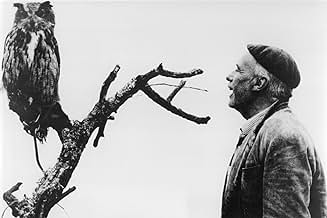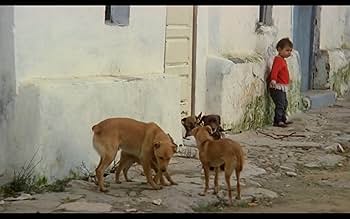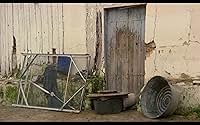IMDb-BEWERTUNG
8,1/10
5114
IHRE BEWERTUNG
Füge eine Handlung in deiner Sprache hinzuSpain, 1960s. The family of poor farmers work hard in the countryside for the rich landowners who exploit them.Spain, 1960s. The family of poor farmers work hard in the countryside for the rich landowners who exploit them.Spain, 1960s. The family of poor farmers work hard in the countryside for the rich landowners who exploit them.
- Auszeichnungen
- 6 Gewinne & 4 Nominierungen insgesamt
Pepín Salvador
- Obispo
- (as José Salvador)
Empfohlene Bewertungen
The last twenty five years of Spanish filmography have produced a number of titles which have indulged in sociological themes, mostly using the years of the Franco Régime as a background when not a mere scapegoat. El Sur (Victor Erice)(qv), Las Ratas (Giménez Rico)(qv), Las Bicicletas son para el Verano (Jaime Chávarri) as well as several by the now deceased Pilar Miró, come to mind. But perhaps none reach the powerful endorsement achieved in Los Santos Inocentes, carefully and predictably directed by Mario Camus. Faithfully transferred from the book by Miguel Delibes, also author of Las Ratas, as well as singularly impressive narratives such as Cinco Horas con Mario, a true tour de force in contemporary literature, and the intensely lyrical and moving El Camino, Camus inspired the principal actors - Paco Rabal, Alfredo Landa and Terele Pávez - into producing some memorable scenes.
Scenes of illiterate peasants obeying their master, landowner, insensible to everything except his passion for hunting; peasants who were so hugely grateful for the handful of pennies so compassionately handed out by the rich duchess; peasants who grovelled in the filth of their mean shack and could barely write their own names. Spain: about 1962 if the registration number of the big black Mercedes is anything to go by. Spain, in the region called Extremadura, which even today is the poorest part of the country. Spain, governed by a dictator who himself was extremely uncultured.
Camus, armed with the simple but sincere exposition in Delibes' novel, manages to show this plight, but without the tremendism so frequent in Spanish books or films; without any soured feelings, but dispassionately, like a surgeon operating for the five hundredth time on gall-stones. The story was there to be told and not sympathized over. Not for the pop-corn eating public, more for the discerning cinema-goer who can give what the film demands: attention to details. The incision is precise, exact, giving greater credibility to this little masterpiece.
Scenes of illiterate peasants obeying their master, landowner, insensible to everything except his passion for hunting; peasants who were so hugely grateful for the handful of pennies so compassionately handed out by the rich duchess; peasants who grovelled in the filth of their mean shack and could barely write their own names. Spain: about 1962 if the registration number of the big black Mercedes is anything to go by. Spain, in the region called Extremadura, which even today is the poorest part of the country. Spain, governed by a dictator who himself was extremely uncultured.
Camus, armed with the simple but sincere exposition in Delibes' novel, manages to show this plight, but without the tremendism so frequent in Spanish books or films; without any soured feelings, but dispassionately, like a surgeon operating for the five hundredth time on gall-stones. The story was there to be told and not sympathized over. Not for the pop-corn eating public, more for the discerning cinema-goer who can give what the film demands: attention to details. The incision is precise, exact, giving greater credibility to this little masterpiece.
10sukerman
In this film, you can see a important part of the recent history of my great country. This film is about the life in a big "cortijo" after civil war in 50-60´S, you can see the lives between rich people, like "señorito Ivan", and poor, like "Paco el Bajo", and how are the relations between this kind of people,they are near to the slavery. Besides, you can see poverty´s ravage, and the many different kind of familiar´s drama.
The DVD I received from Corte Ingles includes a trailer for "Boda de Sangre" (Lorca) and this film is similar in spirit, but with even greater tension. This story is reminiscent of Cela's "Familia Duarte", and indeed the DVD includes a trailer to Cela's "Colmena" also, though I haven't seen that film.
I agree with the strong evaluations and comments of other viewers. I'll add that I enjoyed the handling of time in the film, through intermittent flashbacks and juxtapositions of modern elements - e.g., the automobiles driven by the landowners - with the nearly stone-age level of the protagonist family.
Yet for me, the level of dramatic tension became, frankly, too great to bear. I don't know how I could have handled it in a theater. Given I had mouse control, I interrupted it a few times for relief. Then, about two-thirds through, I forwarded the film to see the end. There are occasions when social realism can produce a tale of social horror harder to watch and bear than anything Hollywood's chainsaw boys ever dreamed of.
The acting and cinematography are excellent. I can imagine viewers trying to laugh at Azarias' (Francisco Rabal) rustic charm. His performance is unforgettable - especially as he, like a hand of fate (azar) delivers the much-needed catharsis near the end - but I, and I presume most, will surely view him as a charming and touching victim, fleeing reality to the extent his old age permits - until a certain cruel act drives him to action.
I would have preferred a balancing of the harshness of this film with more moments of beauty to serve as relief, as in the French Manon (e.g., Jean de Florette) films. But here, the actual social conditions were far harsher - "epoca negra" stuff at its worst - and I presume that to add such relief would have been untrue to history. For me, Familia Duarte and Boda de Sangre sufficed.
I will conclude in recommending some of Delibes' recent works. He has a wonderful sense of humor and a great versatility of style that enables him to relate even everyday events in the most charming and entertaining way. It's hard to believe that the same man who wrote Santos Inocentes also wrote "Diario de un Jubilado" and "Mis Amigas las Truchas" or "Las Perdices de Domingo". And hard to believe how far Spain and Europe have come.
I agree with the strong evaluations and comments of other viewers. I'll add that I enjoyed the handling of time in the film, through intermittent flashbacks and juxtapositions of modern elements - e.g., the automobiles driven by the landowners - with the nearly stone-age level of the protagonist family.
Yet for me, the level of dramatic tension became, frankly, too great to bear. I don't know how I could have handled it in a theater. Given I had mouse control, I interrupted it a few times for relief. Then, about two-thirds through, I forwarded the film to see the end. There are occasions when social realism can produce a tale of social horror harder to watch and bear than anything Hollywood's chainsaw boys ever dreamed of.
The acting and cinematography are excellent. I can imagine viewers trying to laugh at Azarias' (Francisco Rabal) rustic charm. His performance is unforgettable - especially as he, like a hand of fate (azar) delivers the much-needed catharsis near the end - but I, and I presume most, will surely view him as a charming and touching victim, fleeing reality to the extent his old age permits - until a certain cruel act drives him to action.
I would have preferred a balancing of the harshness of this film with more moments of beauty to serve as relief, as in the French Manon (e.g., Jean de Florette) films. But here, the actual social conditions were far harsher - "epoca negra" stuff at its worst - and I presume that to add such relief would have been untrue to history. For me, Familia Duarte and Boda de Sangre sufficed.
I will conclude in recommending some of Delibes' recent works. He has a wonderful sense of humor and a great versatility of style that enables him to relate even everyday events in the most charming and entertaining way. It's hard to believe that the same man who wrote Santos Inocentes also wrote "Diario de un Jubilado" and "Mis Amigas las Truchas" or "Las Perdices de Domingo". And hard to believe how far Spain and Europe have come.
In the opening scenes of this movie, I couldn't tell what century it was. The peasant family living in their hovel with no electricity or running water and their subservient attitude toward the master made me wonder if this movie was taking place in the 19th century. But no, a car appeared, a model from the 1960s, so I knew that it took place in relatively recent times.
Filmed in muted, grayish tones reminiscent of a Goya painting, this film gives one an idea of what life must have been like, not only for Spanish peasants in the Franco era but also for medieval serfs and slaves in the pre-Civil War South. The master and mistress treat their own whims as more important than the peasants' needs, require them to act and speak in a subservient manner, act as if small favors are huge concessions (The family gets to move into a house with electricity!), and literally treat the men of the family as if they were hunting dogs, forcing them to fetch the game that the master spends an inordinate amount of time shooting. In one case, a man is forced to fetch while trying to recover from a broken leg. When foreign visitors criticize the master and mistress for their treatment of the peasants, they make a big show of demonstrating that the peasants are happy and can write their own names (but only because they have just been taught).
But the world is changing, and even the meekest peasant may reach his limit...
Unfortunately, this film has never been released on DVD for Region 1, and the Region 2 version is out of print, so few people will be able to see this brutal but fascinating glimpse of the twilight of an era when Spanish society was composed of countless little dictatorships.
Filmed in muted, grayish tones reminiscent of a Goya painting, this film gives one an idea of what life must have been like, not only for Spanish peasants in the Franco era but also for medieval serfs and slaves in the pre-Civil War South. The master and mistress treat their own whims as more important than the peasants' needs, require them to act and speak in a subservient manner, act as if small favors are huge concessions (The family gets to move into a house with electricity!), and literally treat the men of the family as if they were hunting dogs, forcing them to fetch the game that the master spends an inordinate amount of time shooting. In one case, a man is forced to fetch while trying to recover from a broken leg. When foreign visitors criticize the master and mistress for their treatment of the peasants, they make a big show of demonstrating that the peasants are happy and can write their own names (but only because they have just been taught).
But the world is changing, and even the meekest peasant may reach his limit...
Unfortunately, this film has never been released on DVD for Region 1, and the Region 2 version is out of print, so few people will be able to see this brutal but fascinating glimpse of the twilight of an era when Spanish society was composed of countless little dictatorships.
This is one of the best Spanish movies I have seen. For many reasons. First, the story, which is based on a great novel by the brilliant writer Miguel Delibes, can be seen from different points of view: as the characters in themselves, or as the history of the spanish society through two generations. Second, the actors do an incredible performance (Paco Rabal and Alfredo Landa are really fantastic, not to mention Juan Diego, Mary Carrillo, Terele Pávez...). Third, the scenes' directing and editing rise to the occasion. The result is a fresh, intelligent and charming film that we won't forget for a long time. Perhaps Belén Ballesteros and Juan Sachez's performances aren't worthy of the occasion, but that's the least of my worries.
Wusstest du schon
- WissenswertesVoted eighth best Spanish film by professionals and critics in 1996 Spanish cinema centenary.
- VerbindungenFeatured in ¡Qué grande es el cine!: Los santos inocentes (1996)
Top-Auswahl
Melde dich zum Bewerten an und greife auf die Watchlist für personalisierte Empfehlungen zu.
- How long is The Holy Innocents?Powered by Alexa
Details
- Erscheinungsdatum
- Herkunftsland
- Offizieller Standort
- Sprache
- Auch bekannt als
- The Holy Innocents
- Drehorte
- Produktionsfirmen
- Weitere beteiligte Unternehmen bei IMDbPro anzeigen
- Laufzeit
- 1 Std. 47 Min.(107 min)
- Farbe
- Sound-Mix
- Seitenverhältnis
- 1.66 : 1
- 1.78 : 1
Zu dieser Seite beitragen
Bearbeitung vorschlagen oder fehlenden Inhalt hinzufügen

![Tráiler [OV] ansehen](https://m.media-amazon.com/images/M/MV5BMDA4ZTRjZjktOTJjYi00MGRlLWE3NDktYzgzNDAyYjk4NjY5XkEyXkFqcGdeQXRyYW5zY29kZS13b3JrZmxvdw@@._V1_QL75_UX500_CR0)





























